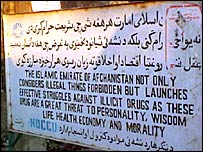DRCNet
in
Afghanistan:
Reformer
Conference
Approaches
in
Kabul
as
Americans
and
Russians
Decry
Afghan
Opium
Trade
9/23/05
Click here for Chronicle editor Phil Smith's daily dispatches from Afghanistan this week and next! With Afghanistan this year still producing bumper poppy crops and supplying nearly 90% of the world's opium and its derivative, heroin, alarm bells are ringing from Moscow to Washington. United Nations technocrats, British politicians, Russian defense ministers, and American congressmen alike are clamoring for a tougher war on drugs in Afghanistan to break the back of the opium economy. The US government is beginning to spend hundreds of millions of dollars this year to fight the opium trade, and British and NATO forces on the ground as ostensible peacekeepers are finding themselves drawn into a battle with powerful drug traffickers, some of whom are linked to the government in Kabul the peacekeepers are protecting.
Drug War Chronicle will be there. Editor Phillip Smith will be reporting from Kabul next week and the following on the conference and related topics. In the meantime, Rep. Henry Hyde (R-IL), chair of the House International Relations Committee, is warning that Afghan heroin is not only undermining stability in Afghanistan, but that profits from it are financing insurgents in Iraq as well. "We know that illicit drugs fuel and finance terrorism in Afghanistan, where the opium and heroin in the region originates," Hyde wrote in a September 8 letter to Secretary of State Condoleeza Rice. "It passes out through terrorist-controlled areas, is taxed by them, and helps finance and arm our terrorist enemies." And not just in Afghanistan. Hyde warned of an "emerging and dangerous growth of the illicit drug trade in Iraq, especially with heroin, now originating and pouring out of nearby Afghanistan. We can no longer ignore the threat to our national security from drugs in Iraq," Hyde wrote in the letter, a copy of which was obtained by the Washington Times. Hyde's suspicions were seconded by former Pentagon anti-drug official Andre Hollis, who told the Times Iraqi intelligence had documented drug smuggling routes cutting from Iran into Iraq and then on into European drug markets via turkey. "Iraq has become a transit route for drugs, which are sold in both Europe and in Iraq and are used to further destabilize Iraq by funding anti-coalition militant activities in Iraq," Hollis said. While Rep. Hyde and other Washington conservatives are worried about Afghan heroin funding anti-American insurgencies, Russia's defense minister, Sergei Ivanov, was worried about all the smack that he says is headed his way. In comments Monday to the RIA-Novosti news agency, he warned that as much as 500 tons of heroin could be flooding into Europe by year's end. "Production of pure heroin (in Afghanistan) is on the rise, and this year, if it is possible to put it this way, 500 tons of the substance may be supplied to the markets in Russia and Western Europe," he said during a cabinet meeting with Russian President Vladimir Putin. With opium remaining the mainstay of the Afghan economy and providing a living -- directly or indirectly -- for millions of Afghans, the West's Afghan opium problem is unlikely to go away soon. Perhaps the Senlis Council can present a less bloody, costly, futile alternative then yet more of the same old war on drugs.
| |||||||||||||||||||||||||||||||||||||||||||||||||||||||||||||||||||||||||||||

